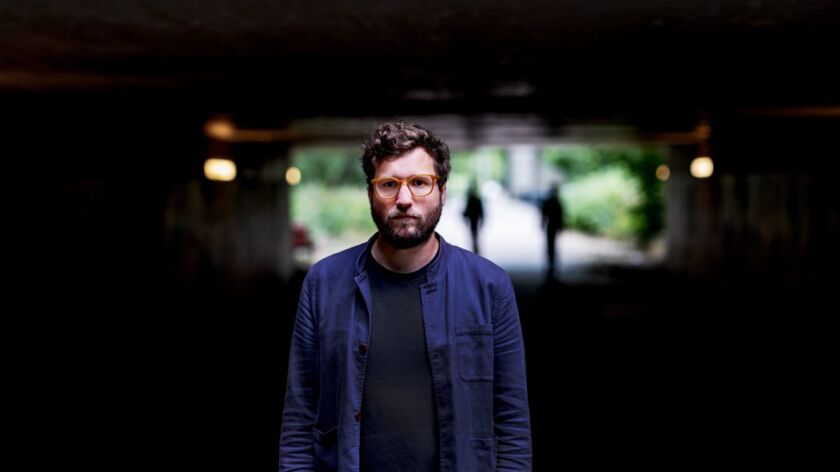Professor of Constitutional Law: ‘It is not up to the Minister, but up to the University to judge whether Harry Pettit has gone too far or not’
-
 Harry Pettit. Foto: Duncan de Fey
Harry Pettit. Foto: Duncan de Fey
Minister of Education Gouke Moes cannot force Radboud University to press charges against Harry Pettit, says Professor of Constitutional Law Paul Bovend'Eert. Still, the University cannot simply ignore the lecturer's statements on social media.
Radboud University cannot ignore Assistant Professor Harry Pettit’s utterances on social media about Gaza, says Professor Emeritus of Constitutional Law Paul Bovend’Eert in an interview with Vox.
During last week’s occupation of the Goudsmitpaviljoen by pro-Palestine demonstrators, Pettit tweeted, among other things, that it was time to finish ‘what the Palestinians started on Oct 7th.’ Pettit’s tweets are attracting a lot of attention and criticism. Only last week, for example, De Telegraaf columnist Nausicaa Marbe wrote indignantly about ‘hundreds of discriminatory and terrorist-inspired words by a lecturer.’
When asked whether Pettit’s statements on social media incite violence, Professor Bovend’eert refrains from commenting, but he does think the University should at the very least have a talk with its staff member.
Code of Conduct
Outgoing Minister of Education Gouke Moes (BBB) expressed less diplomatic views on the matter in a talk show last week. He believes Radboud University should press charges against the lecturer and pro-Palestine activist. The Executive Board previously indicated that this type of interference from the Minister was inappropriate.
How far does the academic freedom and freedom of expression of university employees reach?
Paul Bovend’Eert: ‘Regarding Harry Pettit’s statements on X, the issue is not academic freedom, but freedom of expression. Indeed, Pettit is expressing his views not so much on a research topic as on the situation in Palestine and on Palestinians and Israel.’
‘You can’t just always say whatever you want in public. You are not allowed to insult or discriminate against people. Nor are you allowed to incite violence or sow hatred – remember the earlier case surrounding Geert Wilders (The Hague Court of Appeal convicted the PVV politician in 2020 for his ‘fewer Moroccans’ statement, Eds.). These are offences that restrict freedom of expression.’
What does this mean in practice for university employees?
Bovend’Eert: ‘That they should be careful in their statements as employees, and take care not to damage the reputation and prestige of the University. They should also avoid making statements that are intimidating, for example towards students, or that create a socially unsafe situation in the work environment.’
Is this described in a code of conduct?
Bovend’Eert: ‘Academic staff members are subject to the Code of Conduct for Research Integrity, which states that you are responsible for your behaviour, actions, teaching, and research. You not only have the freedom to express your opinions, but also the responsibility to do so with care and not cause serious damage to the organisation in which you work. Moreover, you have to take into account the importance of a socially safe environment.’
Pettit posted the statements in question on X. Did he do so as an employee of the University?
Bovend’Eert: ‘Absolutely. Compare it to civil servants in civil service law: it does not matter whether they make certain controversial statements before or after 5 p.m. Incidentally, in this case Pettit does not seem to be claiming that he made these statements privately.’
How should the University deal with this kind of situation?
Bovend’Eert: ‘The employer, in this case the Dean and the Executive Board, will have to investigate the statements. Are the statements academically meticulous? Are they intimidating? Do they damage the University’s reputation? The judiciary can help with that, because there are limits to freedom of expression.’
What action can the University take if it believes the statements to be unacceptable?
Bovend’Eert: ‘The Dean – or the Executive Board – should talk to the employee and tell them that they are harming the employer. If the behaviour recurs, you can issue a warning or reprimand. If that does not help either, then you can think of other measures, such as suspending someone. Ultimately, it could lead to dismissal.’

What if the employee disagrees?
Bovend’Eert: ‘Then they can go to court. The court can then assess whether the employer was justified in taking these measures or not. That’s how things work in a rule of law.’
Can the University disregard this case?
Bovend’Eert: ‘No, as a university, you also have a responsibility. If someone says really discriminatory things, you cannot tolerate it; there have to be legal consequences. That is where a limit is crossed, as it would be if a person did something else that created a socially unsafe situation, or tarnished the University’s reputation. It is up to the administrators to make that decision.’
The pro-Israel Centre for Information and Documentation on Israel (CIDI) previously filed charges against Pettit. The Public Prosecution Office decided not to prosecute him. If it had decided to prosecute, would this affect the employee’s appointment?
Bovend’Eert: ‘If it had led to a conviction for incitement to violence or discrimination, the question would automatically arise whether this person could still function in an organisation. But as an organisation, you don’t have to wait for a conviction. You can first talk to the employee, then build a file, and then take other steps.’
What is your personal opinion regarding Harry Pettit’s statements? Are they calling for violence?
Bovend’Eert: ‘I am not going to venture there: to answer that question, I would have to study all the statements and put them in context. Besides, I don’t know what he says in his lectures. I assume the University has kept a good record of all this.’
In the Café Kockelman TV programme, outgoing Minister of Education Gouke Moes said he thought the University should press charges against Pettit. Can he impose this on the University?
Bovend’Eert: ‘I think it’s an idiotic approach, really ridiculous. The Minister of Education has absolutely no recourse in this situation. It is up to the Executive Board to decide whether an employee has gone too far or not. That may or may not lead to measures being taken.’
‘All the Minister can do is press charges himself’
‘All the Minister can do is press charges himself. Or wonder whether the Executive Board should not take action in the employer-employee relationship, because the man is going too far in his statements.’
‘To then immediately bring in criminal law… If you say that the University should press charges, then you also have to specify what criminal offence Pettit has committed.’
Does the Minister of Education have any means of forcing an Executive Board to do anything? In Café Kockelmann, he referred to an escalation ladder that included taking the matter to the Supervisory Board or the Education Inspectorate.
Bovend’Eert: ‘That’s all nonsense, because such matters are not within the Minister’s competence.’
University spokesperson: ‘No conversation has yet taken place with the Minister about Pettit’
Harry Pettit has no intention to tone down his pronouncements on X in response to Minister of Education Gouke Moes’ statements, he reveals in a response to Vox. ‘This is just an attempt by a minister to silence an academic and an individual who wants to spread knowledge about the nature of Zionism and combat misconceptions about the Palestinian resistance.’ He did not respond to questions about any implications his tweets may have for his position at the University.
In response to questions from Vox about Pettit’s tweets, a Radboud University spokesperson replied: ‘We take action on behaviour that is not in line with our rules of conduct. In case of occupation and destruction of buildings, we will file a report. If statements made by employees are not in line with the University’s Code of Conduct or the social media regulations, we initiate a conversation with those involved and/or the employee is called to account by their supervisor. If necessary, the supervisor can impose measures. We do not make pronouncements about individual cases.’
A conversation between the Minister of Education and President of the Executive Board Alexandra van Huffelen about Pettit’s statements on X has not yet taken place, according to the spokesperson. ‘Now that the Minister has announced that he wants to talk to us about this employee, we will wait for that.’




